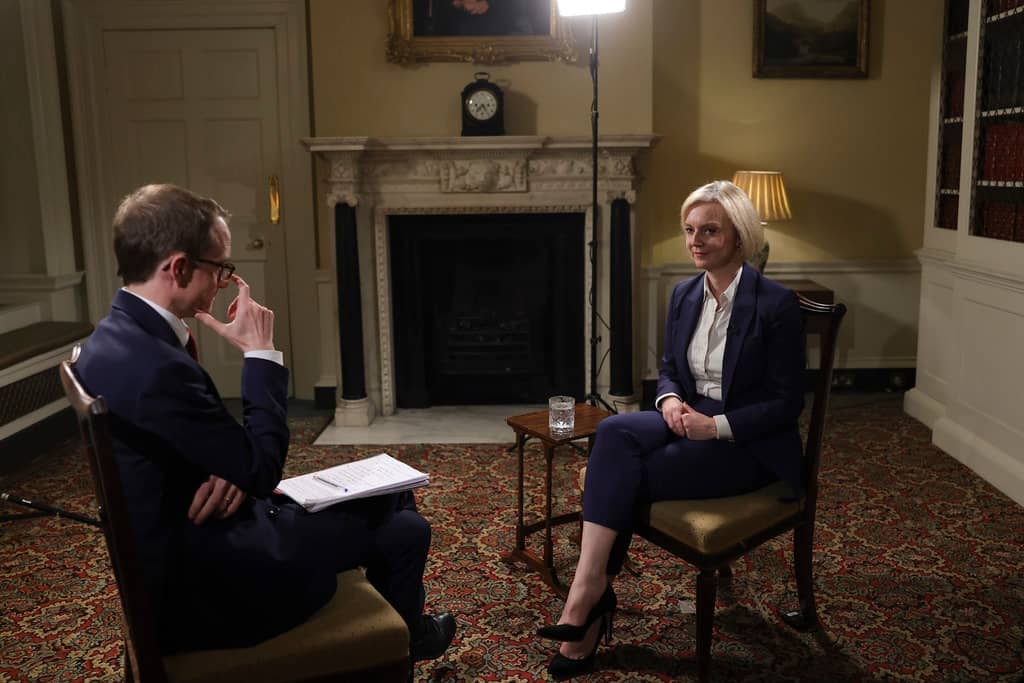Spare a thought for Liz Truss’s communications advisers. They’re following the unwritten rules of crisis management to a tee, but it’s only making things worse. They find themselves in this quandary partly because the government’s situation is uniquely bad – and partly because the Prime Minister is so bad at communicating.
Watching Truss’s interview with the BBC’s Chris Mason last night, many viewers will have had thoughts such as ‘please make it stop’. Others might ask: why is she doing this? Going on TV to confirm that you’ve failed – but still think you can lead your party into the next general election – really doesn’t make things better. Likewise the frozen gaze, the startled blinking and the awkward laughing, all of which offered no comfort to an electorate facing economic anxiety. The overall effect was irritation, not reassurance.
Sometimes the hole is so deep it doesn’t really matter if you keep shovelling or not
So why did it happen? Why did the No. 10 comms team think it was a good idea to put Truss on TV last night? When you face a political crisis caused by your own side, conventional wisdom says you need to do several things. First, you need to ‘fess up: level with people about what’s gone wrong, apologise and say what you’ll do to fix it. The sooner you do this, the better. When you do it, throw everything into it. Address as many failures as you can, as visibly as you can. In the words of one veteran of political communications: if you have to eat something unpleasant, hoover it up as quickly as you can so there’s nothing left.
You do this to ‘move the story on’ – feed the beast until it’s sated, or at least hungry for different meat. Your public contrition means you can now say to the waiting media: ‘I’ve apologised for that so let’s talk about the thing I’m doing now.’ By embracing your failures, you confine them to the past and are free to address the present and future.
So it makes perfect sense for a comms team to send their prime minister out on television to say sorry in hopes of moving the story on. And that painful interview was probably still a better option than silence, with Truss giving the impression of incarcerated impotence.
But the interview won’t move the story on for Truss. Partly because the things she apologised for are just too big: she’s effectively just said sorry for the error of her entire political agenda. Partly because she’s had to hand the ‘and this is how we’ll fix it’ element to someone else. The interview told Britain that Truss knows she screwed everything up – but it’s Jeremy Hunt left picking up the pieces.
The other problem is of course Truss herself. She’s just bad at this stuff. In person, she can be sparky and spiky and engaging. On camera, she struggles to project character or presence. That’s a problem at the best of times – and these are the worst. It means the shakiness of Truss’s interview technique isn’t a quirk, it’s a material issue for her government. It undermines the fundamental mission of projecting reassurance and stability.
When I’m worrying about my mortgage and my country, I want to turn on the TV and get a sense from the people in charge that things are going to be okay. I don’t want to look at my country’s leader and wonder: is she okay?
So again, spare a thought for Truss’s advisers. They’re doing the right things, but it won’t matter. Despite popular myths about the power of ‘spin doctors’, comms isn’t all-powerful: you can’t dress up a broken product. Truss has tarnished her own brand and her government’s credibility; the best interviewee in the world couldn’t move this story on.
Was it a mistake to do last night’s interview, given that it probably did more harm than good? Some observers might think of the old adage: when you’re in a hole, stop digging. But that’s not always true. Sometimes the hole is so deep it doesn’t really matter if you keep shovelling or not.







Comments